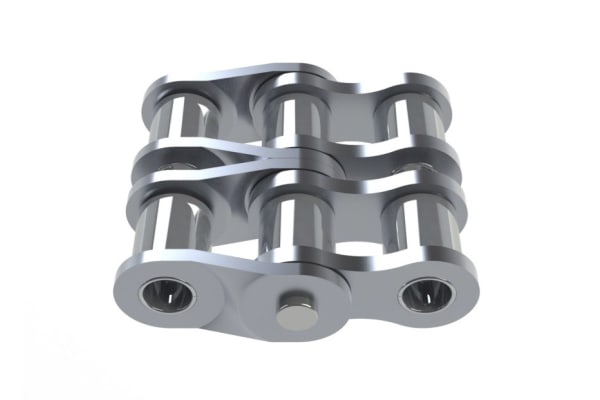Roller Chain Links
Roller chain links are the individual components that make up a roller chain. Chain links are available in both European standards and American (ANSI) standards, with a range of pitch sizes available. Roller chain link components consist of the following:Roller links – complete assemblies consisting of two inner plates with two bushes press fitted into them. Each bush is surrounded by a free rotating roller. These rollers are held together side by side with pin links.Pin links – two outer plates, one of which has two pins riveted into it. These pins slot inside the adjacent roller link bushes and the second outer plate is then press-fitted on to the pins and riveted in place. This type link provides optimum security.Connecting Pin LinksConnecting pin links are used to join two ends of a roller chain together. These connecting pin links consist of an outer plate which is fitted with two pins that slot inside the adjacent roller link bushes and a connecting plate which is fitted separately. These connecting pin links are available in three types:Spring Clip Type – the connecting plate is secured using a clip that slides across the end and slots into grooves that are cut into the end of the pin.Cotter/Split Pin Type – the connecting plate is secured by inserting a cotter pin (or split pin) through the end of each connecting pin. These two methods provide a ‘clearance’ fit where there is always a clearance formed between the pin and the hole when assembled.Press-fit Type – the connecting plate is press fitted on to the pins and secured by a cotter pin or split pin. This type of connecting link is the standard connecting link for ANSI series detachable chains and can also be used on riveted chains which are used in high speed or tough applications. This method provides an interference fit where there is friction or interference when the pin is inserted into the hole.Offset Pin LinkThis link is a combination of a roller link and a pin link and consists of two offset plates a bush and a movable pin with that is held in place by a cotter pin or split pin. These links are used when the chain length is an odd number of pitches and the link increases or decreases the length of the chain by one pitch. This practice is not recommended. This type of link is also available as a two pitch offset link which comprises of one offset and one roller link.



